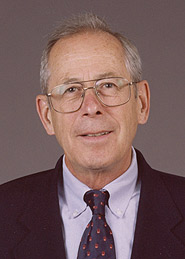Berkeleyan
Renowned cosmologist James Peebles to deliver Hitchcock Lectures
![]()
04 October 2006
 James Peebles |
One of the world's foremost cosmologists, P. James E. Peebles, will deliver two lectures next week - exploring what our universe is like "in the large" and how it got that way - as part of the campus's Hitchcock Lectures series. His first address, on Tuesday, Oct. 10, is titled "Exploring the Large-Scale Nature of the Universe." The following day, Wednesday, Peebles will speak on "Triumphs and Challenges for Modern Cosmology." Both talks start at 4:10 p.m. in the International House Auditorium, 2299 Piedmont Ave.
Born in Manitoba, Canada, in 1935, Peebles has helped to transform cosmology into a focused and rapidly advancing science for more than 40 years. The Albert Einstein Professor of Science, Emeritus in Princeton's physics department, where he received his Ph.D. in 1962, Peebles laid the foundations for many modern cosmological investigations by predicting the existence of cosmic background radiation, popularizing the notion of "dark matter" in the universe, and developing a theory of how the universe evolved into galaxies. He also pioneered statistical tests to track and quantify the motions of matter in the cosmos - necessitating, in turn, the creation of new computer-based simulations to compare competing theoretical models. Peebles' books, The Large-Scale Structure of the Universe (1980), Quantum Mechanics (1992), and Principles of Physical Cosmology (1993), have defined much of the language and scientific agenda of his field. He continues to study the related issues of cosmological tests, the nature of dark matter, and the origin of the galaxies.
"Perhaps more than any other scientist of our age," says astronomy professor Jack Welch, "Peebles has helped define our place in the cosmos."
The lectures are free and open to the public and are wheelchair-accessible. For information, call 643-7413 or e-mail lectures@berkeley.edu.

